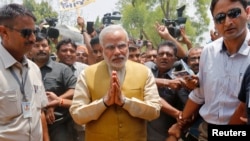Narendra Modi, who is set to become India's next prime minister, had a modest upbringing that stands in contrast to that of his chief political rivals in the Nehru-Gandhi dynasty.
Modi grew up in a lower-middle class home in the western state of Gujarat, where his father worked as a railway station tea vendor and his mother served as a domestic helper.
At a young age, Modi joined the Rashtriya Swayamsevak Sangh, a right-wing Hindu nationalist organization that he says educated and instilled a sense of discipline in him.
Since 2001, he has served as the chief minister of Gujarat, where he has overseen a period of rapid growth that has given him a reputation as an economic reformer.
His political career was once in jeopardy following criticism of his handling of religious riots in 2002 in Gujarat that left more than 1,000 people dead, mostly Muslims.
Modi denies wrongdoing in the anti-Muslim riots, which are believed to have been sparked when Muslims set fire to a train carrying Hindu pilgrims.
Late last year, an Indian court ruled there was not enough evidence to prosecute him.
Modi grew up in a lower-middle class home in the western state of Gujarat, where his father worked as a railway station tea vendor and his mother served as a domestic helper.
Narendra Modi
Narendra Modi, the man set to become India's next prime minister:- Member of main Hindu nationalist Bharatiya Janata Party
- As a child, helped his father sell tea at a railway station
- Served as chief minister of Gujarat state since 2001
- Criticized for handling of deadly Hindu-Muslim riots in 2002
- 63 years old; unmarried; has no children
Since 2001, he has served as the chief minister of Gujarat, where he has overseen a period of rapid growth that has given him a reputation as an economic reformer.
His political career was once in jeopardy following criticism of his handling of religious riots in 2002 in Gujarat that left more than 1,000 people dead, mostly Muslims.
Modi denies wrongdoing in the anti-Muslim riots, which are believed to have been sparked when Muslims set fire to a train carrying Hindu pilgrims.
Late last year, an Indian court ruled there was not enough evidence to prosecute him.





